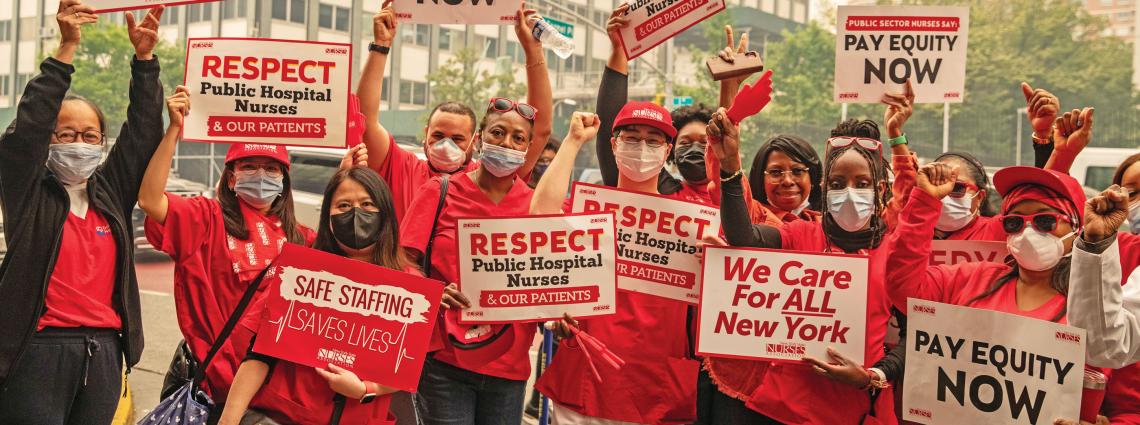Public-Sector Nurses Take Action and Build Momentum to Win

NYC Health+Hospitals (H+H)/Mayorals nurses have been taking action and building momentum in their fight for a fair contract — holding two major protests, one on May 10 in Foley Square and on June 7 at Bellevue; speaking out at H+H annual board meetings at Harlem Hospital, Elmhurst and Jacobi; and marching on the boss. Their efforts have garnered significant public support and attention from elected leaders, allies and major news outlets. High-profile allies, including Reverend Al Sharpton and New York City Public Advocate Jumaane Williams, have joined NYSNA’s protests.
Sonia Lawrence, RN, BSN, at Lincoln Hospital and president of NYSNA’s NYC H+H/Mayorals Executive Council, explained the crisis of high turnover and understaffing: “So many of our experienced nurses are exhausted, burned out and giving up. They retired or left for better pay and working conditions in the private sector. We have some units where the most senior nurse who is training and mentoring new nurses has only one year of experience — nurses with minimal hands-on clinical training because they graduated during the COVID-19 pandemic are put in charge.”
Elected Leaders Support Pay Parity
Over 100 elected leaders signed a letter in support of pay parity for H+H/Mayorals nurses, including Rep. Alexandria Ocasio-Cortez and many City Council members, state senators, state assembly members, and U.S. senators and members of Congress.
The letter read, “We are in solidarity with nurses at NYC Health + Hospitals who are fighting for a fair contract, pay equity, safe staffing, patient safety, dignity, and respect. The COVID-19 pandemic showed the deep inequalities in our society and in NYC’s public hospitals and health systems. It also showed the importance of the public system for all New Yorkers.”
NYC Comptroller Brad Lander took H+H to task over spending on temporary travel nurse contracts, sending a letter demanding H+H release full details on spending and calling out H+H for spending more on travel nurses than the cost to raise pay for staff nurses.
Speaking Out at City Hall
At two City Hall hearings, public-sector nurses shared stories about how chronic understaffing harms patient care, while City Council members showed their support and grilled H+H representatives with questions about spending on temporary travel nurse contracts.
Musu King, RN, in the Lincoln emergency department, said: “My number one concern is the safety of my patients. As the only Level 1 Trauma Center in the Bronx, we have ambulances bringing people in all day and night. A typical day is hectic, especially because we’re short-staffed. In the critical care area of the emergency department, we should have 5 nurses, so each nurse can safely care for 2 critically ill patients. But usually each nurse has 6 or 7 patients instead. When patients get frustrated with long wait times, they take it out on us. We are trying to take care of everyone at the same time — and that’s impossible.”
Public-Sector Nurses in the News
H+H/Mayorals nurses’ efforts have gained significant attention in major news outlets. Politico reported on the letter that 100 elected leaders signed. The New York Daily News published an article revealing that the city is spending more on temporary agency nurse contracts than pay equity for staff nurses would cost, getting NYSNA’s message out that pay parity is not only the right thing to do but also the fiscally sound thing to do. And TV and radio, including ABC 7, Eyewitness News, WCBS, 1010WINS, WNBC, NY1, New York Daily News, AMNY and NY1 Noticias, have covered the public-sector nurses protests.
Harlem Hospital nurse Beatriz Lugo, RN, published an opinion editorial in El Diario about how low pay for public-sector nurses threatens care for Latinx immigrant patients: “When I first arrived in New York City with my mom and my seven siblings, we had no health insurance and went to Lincoln Hospital for care … I’ve dedicated my career to our public hospitals even though I could have made more money working at a private hospital ... But the work is getting harder and harder. When there aren’t enough nurses at the bedside, those that remain have to work twice as hard and get burnt out, which leads to a cycle of high turnover.”
H+H/Mayorals nurses are continuing to turn up the heat to win their fight for a fair contract!